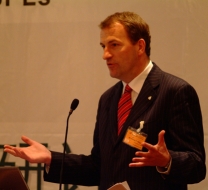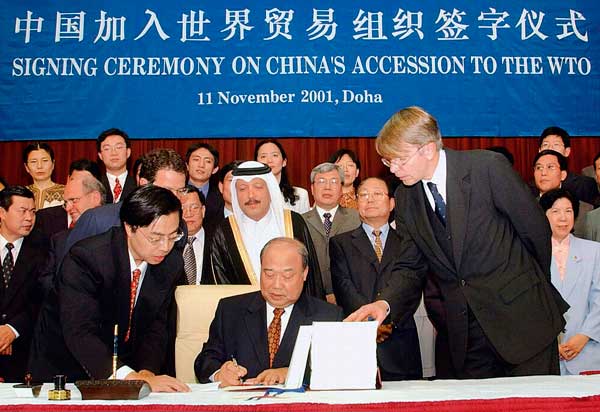NEW YORK JUNE 2003
GLOBAL LOGISTICS FORUM BECOMES GLOBAL INSTITUTE OF LOGISTICS

The Global Logistics Forum (GLF) announced today the setting up of an Institute to build a global network of thought leaders and to study and promote the science of logistics. Since its establishment as a “think tank” at the European Institute of Transport Management” in 1996, the GLF has earned a place as one of the preeminent networking platforms and sources of information on the opportunities and challenges in global logistics.
The first step in the process will be establishing the Institute, setting up its offices and recruiting its senior executives. Kieran Ring secretary of the GLF will be the Institute’s CEO and divide his time between the US, China and Ireland where he is based.
“The Global Institute of Logistics will work tirelessly to build a global network of thought leader committed to collaboration and the development of best practice. We know how central logistics is to globalization and are ready to play our part in its development and professionalisation”
KIERAN F. RING FOUNDER & CEO GIL
THE CHINA FACTOR
The Global Institute of Logistics will encourage and develop collaboration between stakeholders in the global supply chain resulting in higher logistics service quality and consequently a better economic performance of all partners. GIL will focus particularly on shipping lines, stevedoring companies, inland transport operators and forwarders and encourage them to re-think their role in the logistics process, particularly in light of the China factor.

Since China’s accession to the World Trade Organization in 2001 the shift in sourcing from West to East has been exponential. This has led to massive growth in the % of cargo which is flowing intercontinentally, mostly by ship. Today more than 40 per cent of imports into the US are from the overseas subsidiaries of its corporations, while China accounts for about 25 per cent of the global growth of gross domestic product. Both of these factors are imposing a major shift in global freight flows and creating an ever-lengthening supply chain. The lengthening of the supply chain is forcing shippers and their service providers to relate more closely in the pursuit of visibility and process improvement, this phenomenon is leading to the adoption of ‘collaboration’ as one of the central tenets of organisational behaviour in the global supply chain.
Collaboration refers to the creation, development and maintenance of relationships between global supply chain partners resulting in mutual exchange and fulfilment of promises at a profit. It is a philosophy for doing business successfully; it promotes a culture that puts the buyer-seller relationship at the centre of a firm’s strategic and operational thinking. Much work has to be done in the maritime container logistics chain to break down a silo based approach to process execution, which runs almost in the direct opposite to what manufacturers and shippers are expecting.
BACKGROUND:
Global manufacturers are basing decisions on how they organise production and, in fact, their whole corporate structures entirely on the provision of logistics services. The ‘modular production’ model is an example. In this, contract manufacturers carry out production against a background of organisational change. The set-up comprises small and large firms, and small and large geographical scales; it aims to create a large number of products in few processes to receive maximum revenue through economies of scale.
Logistics has grown to become the key unit within this set-up, since it has to provide agility and flexibility for any one module, as well as for the interaction of all modules, in the entire network. That means organisational as well as geographical flexibility. Thus a major shift has occurred in how and where commodities and their components are being assembled, manufactured and distributed.
This combined with the continued push toward efficient manufacturing processes such as lean and Six Sigma mean that it’s not enough to know that critical parts or stocks are on the way or have been shipped. Manufacturers need to know exactly where supplies are in the supply chain, whether they’ve cleared customs, whether they’re sitting in a warehouse or if they’re on the last leg in a journey to the loading-dock or the customer.
The Institute will assist in bringing this awareness to the logistics process through its two primary strategies of building direct relationships between the end user and logistics service provider and by building case studies to support the argument for greater collaboration.
RESEARCH
The Institute’s research programs will identify how companies manage the logistics of global trade and determine how the most adaptive are coping with its challenges. In particular we will research how logistics service providers in the maritime container logistics supply chain respond to the demands of Beneficial Cargo Owners (BCO’s) The aim of our research is to establish accepted best practice , create ‘benchmarks’ and to promote standard operating procedures and their adoption across the global maritime container logistics supply chain.
The research will be leveraged to support our mission to develop a community of thought leaders from across the world who have been identified as committed to building strong relationships in pursuit of a logistics system fit for purpose. Logistics systems are the arteries of trade and central to the success of globalization in the 21st century. These systems will rely heavily on collaboration between stakeholders across continents. Notwithstanding the practical advantages of strong relationships, collaboration has been proved to lead to reductions in inventory, lower costs for shipping, storing, sourcing and handling products.
BEST IN CLASS
Our research will identify and accredit individuals and corporations that the research identifies as “first movers” or “thought leaders” in their approach. Within this parameter the pre-eminent criteria leading to accreditation is that that the organization or individual identified demonstrate an exceptional level of regard for the role and function of relationship excellence in the development of their business and can be demonstrated by a significant level of operational and strategic integration.
METHODOLOGY
GIL will deploy a mixture of primary and secondary research tools in its work. Our primary research will rely heavily on knowledge missions to the areas in which our research is being conducted. There we will use a combination of:
- Formal/ informal interviews
- Direct observation,
- Participation in buying missions & logistics negotiations
- Attendance and participation in conferences
- Focus groups with various stakeholders
to build up a detailed picture of the environment.
RESEARCH SCOPE
1. Collect the widest possible range of viewpoints
2. Identify the key organizations, agencies and individuals
3. Create an industry wide consensus
4. Identify the benchmark operator

